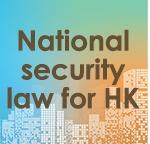Training provided by the central government is essential for the Hong Kong police’s newly formed national security department to operate effectively, former police commissioner Andy Tsang Wai-hung said.
The approach to national security cases cannot be properly learned from day-to-day experience, Tsang said.
National security is a multidimensional matter; it includes issues that city police officers rarely engage in, such as security of the food supply, Tsang told China Daily in an interview.
The Hong Kong National Security Law has been in force for more than a month. It prohibits four categories of crime: secession, subversion, terrorism, and collusion with foreign or external powers to endanger national security.
“So I will not be surprised if training were soon to be provided by the central government to our police officers in the newly established Department for Safeguarding National Security,” Tsang said.
ALSO READ: Squad with national security agencies 'not novel to HK’
The approach to national security cases cannot be properly learned from day-to-day experience, former police commissioner Andy Tsang Wai-hung said
Before the handover in 1997, Hong Kong police’s intelligence agency, the Special Branch, sent officers to the United Kingdom for training under British security agencies MI5 or MI6, recalled Tsang, who joined the force in the late 1970s.
The Special Branch was founded before 1930 and disbanded in 1995. British officers also provided additional training in Hong Kong, he added.
Tsang said it would be normal for similar arrangements to be introduced for the newly established squad.
To date, at least 24 people have been arrested under the National Security Law. But only one suspect has been prosecuted, which according to Tsang indicates prudence on the part of the administration as a whole, including the police and the Justice Department.
Tsang refuted the claim that the police are vested with too much power under the new law. He described the issue as a question of “means and ends”.
The police need sufficient authority to be able to enforce the National Security Law, Tsang said. “You cannot just give them responsibility without giving (corresponding) authority,” he added.
READ MORE: National security: New law boosts police confidence
He called the claim irrational, as it failed to be specific. “If you argue that the police have been given too much power, (one needs to say) which kind of powers given to them are not needed for safeguarding national security,” he said.
Tsang said it’s sad to see some people spread rumors about the implementation of the law for the purpose of scaring people. He described the rumor mill as similar to what took place after the co-location plan at the West Kowloon high-speed rail station was proposed in 2018.
The co-location arrangement allows the Chinese mainland customs officers to operate in designated areas at the station that links Hong Kong to the mainland’s sprawling railway network.
Some people warned others to steer clear of the station because they may be arrested by mainland police, but that never happened, Tsang said. “Such scaremongering serves nobody,” he said.
Noting any new law should be given time to be tested in the courts and be refined by the legal process, Tsang said the National Security Law should be treated the same way.



